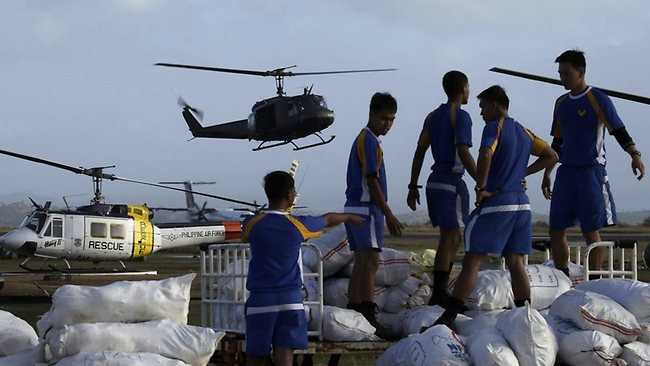
Whenever there’s a natural disaster, such as the recent typhoon in the Philippines, most us tend to think, hear or feel the following things.
“How awful. We must get them help right away. Something has got to be done.”
“It’s so unfair. Here in the U.S., the same intensity storm will do less damage with fewer deaths. Efforts must be made to put our nations on an equal footing.”
Celebrities and others make it their business to let everyone know they’re concerned, and utilize it as an opportunity to show how compassionate they are in a cultural atmosphere that upholds compassion, not competence, as the defining nature of goodness.
But if you really think about it, what can actually help people in third-world countries the most? Granted, short-term emergency assistance (which should be voluntary, not coerced from taxes) is perfectly fine to offer, if you can and if you wish.
But short-term relief cannot change the basic facts. If nations such as the Phillippines are to survive the next storm, it’s ideas they most desperately need.
What kind of ideas? Reason. Science. Technology. Free markets.
Most of these third world countries are that way for a reason. They’re riddled with ignorance and superstition. They place faith in higher powers above rational confidence in the human mind. They succumb to petty dictatorships, because they lack the self-respect to overthrow these authoritarian rulers in favor of a system based on laws, private property and individual rights.
Yet it’s the freely thinking human mind they’re counting on, whether it’s building a fortress against typhoons or turning themselves into an advanced civilization. You can pray to God all you wish, but sooner or later a storm or some other unexpected challenge will hit. It’s rationality, fostered by science and economic freedom, that will prepare you for it.
With natural disasters, ignorant and naïve Americans say, “Government regulations prevent disasters.” But without the technological advancement in engineering, and the political/economic freedom such advancement requires, government regulations are meaningless. Without the material advancements fostered by capitalism and free markets, there’s nothing to regulate. Third-world countries don’t have any regulations (or if they do, they’re meaningless), because they don’t have the economic advancement to make them happen.
Even with disaster relief, it’s only because of science, free markets and capitalism that any relief can be offered (via taxes, or not).
As CNN.com reports today,
“People swarm the helicopters, so we land the helicopters a little bit farther from the population areas,” said Maj. Gen. Romer Poquiz of the Philippine Air Force. “So before the people come in, we would take off, go and drop in other places, drop and then go, drop, go, drop, go, at various places.”
Several countries, including the U.S. military, continued to assist Philippine authorities in a massive relief effort of delivering food and water to the devastated swaths of the archipelago. The central government is being criticized for a slow and disorganized response to what all agree is a catastrophic disaster.
Helicopters? These exist because someone, somewhere at some time chose to exercise reason in the advance of the technology that ultimately led to helicopters. Helicopters also exist because somewhere, at some time, private companies were permitted to make a profit (i.e., keep the fruits of their labor and risks), and continuously develop and improve. If Obama issued an administrative order today that companies making helicopters may no longer make a profit, those helicopters will disappear overnight.
The U.S. military, who’s always on the scene to help with natural disasters anywhere on the planet? If the U.S. had never been respectful of individual rights and capitalism, we’d still be a backwoods nation ourselves. There would be no U.S. military as we know it, available to rescue anyone on the planet, at any time.
Not all human beings have the same intelligence or capacity. Innovators and geniuses are, by definition, the exception and not the routinely normal. It’s precisely this fact that leads most people, even in advanced countries like the United States, to claim, “Life isn’t fair. Therefore, we must equalize things as much as possible.” In practice, this leads to constraints on free markets and free minds, including higher taxes in an absurd and futile effort to move wealth and income around without harming productivity. This, in turn, leads to diminished capacity for economic and technological growth, and ultimately stagnation or worse.
If it’s the downtrodden and the suffering your heart bleeds for, then you ought to be the strongest champion of reason, science, individualism and free markets. The things that make everyone’s lives more sustainable only come from these sources. Without them, we’re all in the same rotten trap as those poor souls facing a typhoon in the Phillippines or an earthquake in Haiti.
If you feel sorry for the people in the Philippines, and you wish to support a charity on their behalf, by all means do so.
But if you really want them to survive the next disaster, and go beyond mere survival, then why not do whatever you can to support the ideas that make these things possible? Push for freedom in America, and push for freedom in the rest of the world. Get the government out of the charity business internationally, and get the government off the backs of business–and science–in our own country. When America has moved towards freedom in the past, the world often follows by example. By selfishly upholding your own freedom and individual rights, you’re upholding it for everyone.
Human beings all require the same thing. Whether you’re in the Phillippines, or in America, your means of survival is reason, and your means of implementing it is freedom. That poor victim in the Phillippines suffering from a natural disaster desperately needs the Declaration of Independence, for-profit companies unhampered by government, and scientific pursuit untainted by ancient, irrational superstition.
So do you.
